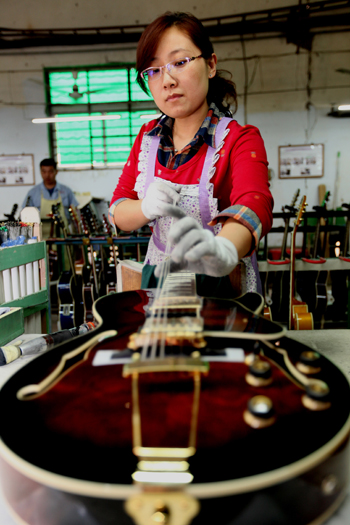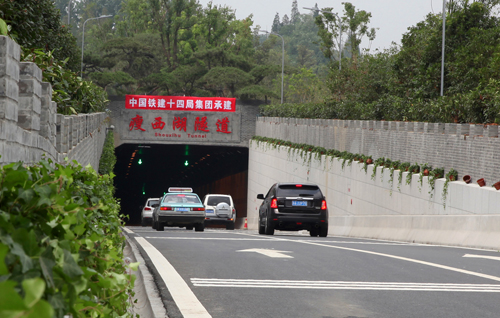|
 |
|
HANDLE WITH CARE: A worker installs strings on a guitar in a factory in Zaozhuang, east China's Shandong Province. The city sells guitars to the EU, the Americas and Southeast Asia, producing more than 100,000 units worth $7 million in annual export sales (SUN ZHONGZHE) |
Cutting Coal Use
To increase cleaner power generation and cut greenhouse gas emissions, China will order power firms nationwide to upgrade coal conservation technology and eliminate outdated capacity.
An action plan for the 2014-20 period was jointly released by the National Development and Reform Commission (NDRC), the Ministry of Environmental Protection and the National Energy Administration on September 19.
The action plan comes after the Central Government approved climate change goals to be met by 2020, when carbon emissions per unit of GDP will be cut by 40 percent to 45 percent from the 2005 level.
It will also bring the proportion of non-fossil fuels to about 15 percent of primary energy consumption by 2020.
With stricter environmental protection standards, China will lower coal-fired generation of electricity to under 62 percent of the national total by 2020, according to the plan. Average coal consumption at new power plants should be less than 300 grams of standard coal per kilowatt hour (kwh). Average coal consumption at existing furnaces should be brought below 310 grams of standard coal per kwh before 2020.
At least 10 gigawatts (gw) of obsolete thermal power capacity will be phased out by 2020. At least 150 gw of coal-fired power generation capacity will be cleaned up by 2015, and another 350 gw by 2020.
Cotton Import Quota
China will not increase its cotton import quota next year beyond the 894,000-ton quota it promised when joining the World Trade Organization, a Chinese official said on September 22.
"We will guide domestic textile enterprises to use more homegrown cotton," Liu Xiaonan, an economic and trade official with the NDRC, said at a press conference in Beijing.
Liu's remarks came after the government removed its long-held temporary cotton purchasing policy and introduced a target price system for homegrown cotton this year.
Under the target price system, the government will subsidize farmers to ensure their earnings when market prices fall below a preset target price, which was set by the NDRC at 19,800 yuan ($3,220) per ton in April.
Currently, the domestic price of ginned cotton stands at about 14,000 yuan ($2,279) per ton, compared with about 11,800 yuan ($1921) per ton on the benchmark U.S. futures market.
Liu expected the price difference on the domestic and international markets to narrow to a "reasonable range," which would help reduce imports of cotton yarn.
He said domestic cotton output will reach 6.5 million tons this year, down 500,000 tons from the previous year, while demand will be around 8.5 million
tons, resulting in a supply gap of 2 million tons.
Gold Market Opens
Foreigners have now been permitted access to China's gold market after the Shanghai Gold Exchange (SGE) launched its international board on September 18.
The yuan-denominated board was launched in the China (Shanghai) Pilot Free Trade Zone, in a move to encourage foreign participation in China's tightly controlled gold market.
"The international board has made China's opening up of the gold market a reality," said Xu Luode, SGE Chairman, adding that foreign participation and rising trading volume will make China a real international market for gold.
The new international board hopes to challenge current gold market leaders London and New York. So far, it has attracted dozens of foreign members, including renowned international commercial and investment banks.
It is the first time in China's capital market that foreign investors have been able to participate in the investment and trading of yuan-denominated products without a capital cap, said a bank dealer on condition of anonymity.
 |
|
NEW OPENING: The Shouxihu Tunnel opens in Yangzhou, east China's Jiangsu Province on September 19. The tunnel will greatly ease traffic pressure in the tourist city (DU ZHENKE) |
FTA Talks
China and South Korea kicked off the 13th round of negotiations for a bilateral free trade agreement (FTA) in Beijing on September 22.
The five-day negotiation covered wide-ranging areas such as tax reductions on trade of goods, the opening up of service sectors, further bilateral investment and the possibility of decreasing trade remedies and technical barriers.
China and South Korea officially launched FTA talks in May 2012. Leaders of the two countries jointly announced in July that they would try to conclude the negotiations by the end of 2014.
China and South Korea have experienced two decades of booming bilateral trade. Two-way trade surpassed $270 billion in 2013, nearly 50 times the volume in 1992, when the two nations established diplomatic relations.
Reducing Financial Risks
China supports the efforts of the Financial Stability Board (FSB) in increasing the capital requirement for global-systematically important banks (G-SIBs) to reduce risks, Zhou Xiaochuan, Governor of the People's Bank of China, said in the Australian city of Cairns as the world's finance ministers and central bank chiefs gathered to discuss economic and financial systems from September 20 to 21.
The FSB started to publish lists of G-SIBs in 2010 and sought to increase their capital requirement to prevent a future global financial crisis. There are 29 G-SIBs worldwide, including two in China, which are the Bank of China and the Industrial and Commercial Bank of China.
Addressing the meeting, Zhou said he expects countries to accelerate reforms on financial derivatives and start cooperation on supervision. He called for further classification of shadow banking for more targeted measures.
The meeting reviewed progress of reforms on financial supervision, set higher capital adequacy ratio for G-SIBs and asked the FSB to finish defining the core factors of the supervisory frame to be placed over shadow banking before the G-20 summit in Brisbane, scheduled for November 15 and 16.
LME Clear to Add RMB
The London Metal Exchange (LME) launched its new clearinghouse on September 22, planning to introduce renminbi (RMB) as cash collateral later this year.
LME Clear, the new clearinghouse of LME, has migrated all of the positions of LME members from previous clearer LCH.Clearnet Ltd. to its own risk and clearing system, LMEmercury.
"Building LME Clear was an important strategic decision because it not only provides the LME immediate and substantial revenues, but also gives the LME and the group the ability to pursue new markets, new products and new capabilities, particularly in extending the LME franchise to Asian time zones and in adding RMB capabilities," said Charles Li, Chief Executive of LME Clear's parent company, Hong Kong Exchanges and Clearing Ltd., also known as HKEx Group.
The LME is the world's oldest and largest market for industrial metals such as copper and aluminum. It set out to build its own clearinghouse three years ago to take over from LCH.Clearnet, allowing it to collect fees not only for transactions on the exchange, but for clearing them as well.
Expansion in China, which accounts for 40 percent of global copper demand, was another key LME strategy, so LME Clear has moved quickly to allow clients to use the RMB as collateral. | 